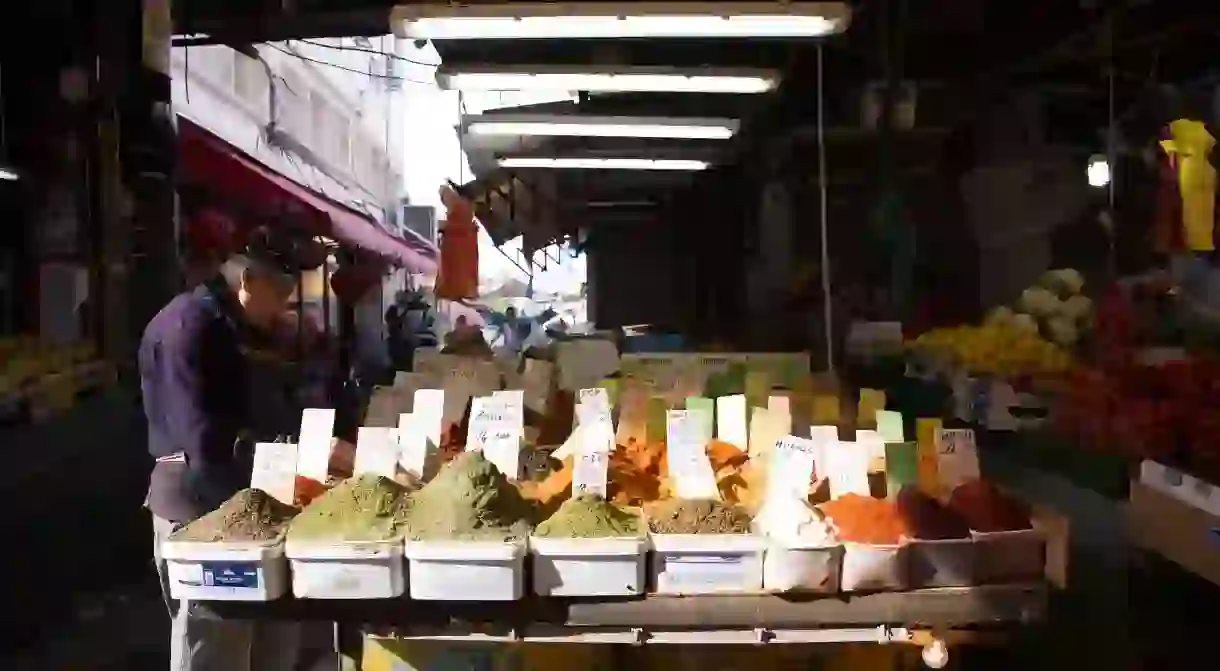A Guide to Tel Aviv’s Best Markets

The great thing about marketplaces, or souks, in Tel Aviv is the superior quality and good value of the produce on offer. The markets here provide visitors with a chance to experience the colours, atmosphere and delicious foods this amazing city has to offer.
Souks have been an intrinsic part of Middle Eastern culture for centuries. They have not only been providing residents with fresh, seasonal produce, but they have also been a place to interact with different communities and cultures. Nearly every major city in Israel has a central souk, with the largest and most famous being Machne Yehuda in Jerusalem and Shuk HaCarmel (Carmel Market) in Tel Aviv. Most are open daily from Sunday to Friday.
Shuk Hapishpishim (Jaffa Flea Market)
Market, Israeli, Middle Eastern

At dusk, before Shabbat, the market turns into a nightlife hotspot as music blares and restaurant tables are dragged out on to the street – the atmosphere is electric. Cafés such as Pu’aa make the most of their location from the plates on which food is served, which are all market finds and are also available for sale.
The Greek Market, Jaffa
Market, Greek, Israeli, Middle Eastern
About a minute’s walk from Jaffa’s famous clock tower at the entrance to Old Jaffa is the Greek Market. Named after the nearby Greek Orthodox monastery that oversaw its foundation in the 19th century, it’s enjoying a renaissance of sorts. It’s an outdoor market that specialises in antiques and vintage clothes. Friday at lunchtime and on Tuesday nights, musicians come out with their bouzoukis and lyres to busk.
Also on Fridays, artists and craftspeople take over the squares and lanes of the small plaza to sell their wares, some of which are made on the spot. Enjoy a coffee or lunch at one of the market’s many bars and restaurants that spill out onto the streets. As the sun goes down, fairy lights strung from trees and lamp posts add to the magical Mediterranean atmosphere.
Shuk HaCarmel (Carmel Market)
Market, Israeli

Organised in a rather haphazard way, fruit sellers set up next to tables laden with mezuzahs, music or milkshakes. It’s important to note that some vendors have earned the ‘buyer beware’ label (it’s likely those adidas trainers are fake). The shuk runs on either side of a narrow street, running south from the junction of King George, Allenby and Shenkin streets. The market is small and compact, but there’s more to it than the main strip. Don’t wander in a straight line but zigzag through intersecting streets to taste and smell everything from bourekas to empanadas. Look out for the increasing number of chefs organising pop-up restaurants alongside stalls selling prepared foods.
Levinsky Spice Market, Florentin
Cafe, Market, Israeli

This market brims with atmosphere as well as aromas: canvas bags of nutmeg, dates and pistachios spill over onto the street. Open every day and just a 10-minute walk from the New Central Bus Station, Levinsky Spice Market is also a great place to eat and drink. Sit and relax with a coffee from Café Atlas or make a quick stop at Yom Tov Deli for some Turkish snacks.
Shuk HaNamal
Market
Prices tend to be higher than those at other street markets, but it’s the best place to find organic produce, including meats, cheese, rainbow carrots and purple potatoes. Many of the stalls around the market sell prepared dishes, with the Kitchen Market providing a more formal eating space. Weekends at the market are the busiest, especially during the morning hours.
Nahalat Binyamin Artist Market
Market

From paintings, photography and picture frames to jewellery, new and repurposed ceramics, glassware and Judaica, vendors sell their own items, so prospective buyers can talk to them about their craft and inspiration. Street performers add to the lively atmosphere.
Sarona Market
Bakery, Bar, Market, Restaurant, Israeli, French, Middle Eastern, Coffee

The city’s restored German Templar Colony reopened in 2015 as the Sarona complex, a food and retail emporium. Sarona is more of a food hall than a market, but it offers international cuisines and some of Tel Aviv’s best food experiences. Savoury offerings include hummus from an outpost of the Jaffa legend, Abu Hassan, cheese from the haute cheesemonger Basher Fromagerie (this cheese shop actually originated in the Machne Yehuda Market in Jerusalem) and ramen from Israeli chef Yisrael Aharoni’s Hiro restaurant.
There are also some very popular pubs and coffee spots. Sarona doesn’t have the same lively atmosphere as Tel Aviv’s outdoor markets, but it’s a lovely new addition in a historic setting.













